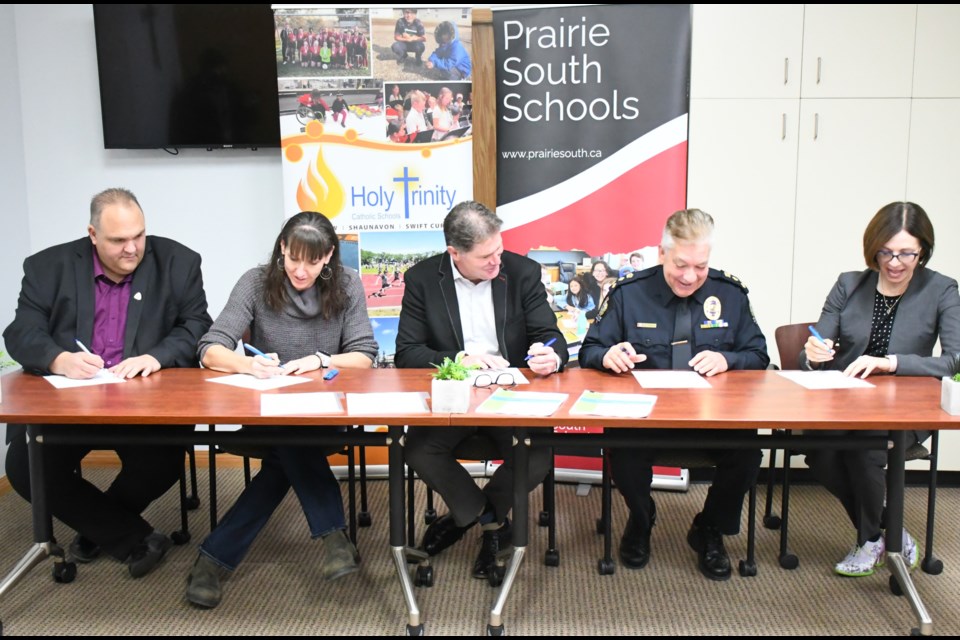MOOSE JAW — Several community partners have re-signed an agreement that aims to make Moose Jaw safer by identifying behaviours that may pose a risk for violence against students, school employees and residents.
Several partners gathered at Holy Trinity Catholic School Division’s board office on Oct. 24 to sign the updated document and recommit their organizations to supporting the .
Present were Prairie С����Ƶ School Division, Holy Trinity, the Moose Jaw Police Service, Saskatchewan Polytechnic and the Ministry of Social Services. Absent were Briercrest College and Seminary, the Saskatchewan Health Authority and the Ministry of Policing and Corrections.
The partners first signed the document in February 2012, revised it in February 2014 and last updated it in February 2018. The coronavirus pandemic prevented them from updating the document until now.
COMTAST is a collaborative response to assessing the violence potential of youths in schools and the community, while it supports collaborative interactions among the partners to reflect safe, caring and restorative approaches, the document explains. It also fosters timely sharing of information and promotes supportive and preventive plans.
The report should be updated every two years to include current practices from the Canadian Centre for Threat Assessment and Trauma Response; the protocol is based on the centre’s Canadian Model of Violence Threat/Risk Assessment (V-TRA).
The partnership’s strength lies in the multidisciplinary composition of the Community Threat Assessment Team (CTAT), the document said.
The school and CTAT members strive to share and review relevant student information, while CTAT aims to share the details of a threatening situation or evidence appropriately and promptly, to collaborate effectively, and to use a broad range of expertise.
“The main partners in this are the schools, so it’s just consistent protocols for our schools to follow and our supports — mental health, social services (and) the police service — that we’re all working together to make sure everybody’s safe in our day-to-day business,” said Brad Moser, chairman of the protocol team.
The protocol is based on partner employees assessing levels of concern with someone — a student or a resident — and using the level 1 VTRA training they’ve received to understand baseline behaviours and when they should be concerned if those baseline actions elevate, he continued.
The protocol and the training allow employees to understand the support the person needs to reduce the concerning baseline behaviours and keep others safe.
“If things are already at an elevated level, where we’re concerned about safety, it is 100-per-cent a 911 call,” Moser said, adding the protocol does not encourage school employees to restrain students physically but teaches them to be aware of behaviours and whether outside supports are required.
Police Chief Rick Bourassa said the agreement has been a valuable tool since it allows the police service to use its investigative abilities to support its partners. He noted that the initiative is “at its best, an early warning system.”
“… but there are those times when it’s a sudden incident that happens. (That is) very, very rare that those happen, but that’s when we take a primary role in maintaining safety immediately,” he added.
“And then, going back into the process to deal with the resources that need to be put in place to prevent future things like that from happening.”
Ward Strueby, Holy Trinity’s education director, said re-signing the document is important since it helps the public understand how the organizations reduce risk while the partners also learn about what’s happening with each other.
All principals and vice-principals receive level 1 and 2 threat assessment training, while they receive updated training during regular administrator meetings and participate in mock scenarios, he continued. For example, they practice how to respond to a student bringing a weapon to school, how to reduce the risk and how to include the other partners.
“We just want to make sure that we take everything seriously, (that) we’re listening to what our kids are saying, and we provide the supports that are required,” Strueby added.




